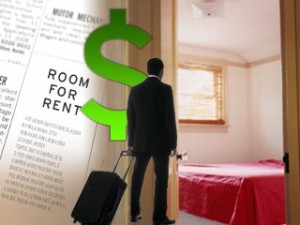Why Renting Trumps Buying
 Today’s media tells us that you haven’t really ‘grown up’ or ‘made it’ until you own your own home. So a lot of people only tend to rent temporarily until they have the finances, right? Or wrong. There are tons of advantages to renting your home instead of actually buying it. Here are 11 reasons why.
Today’s media tells us that you haven’t really ‘grown up’ or ‘made it’ until you own your own home. So a lot of people only tend to rent temporarily until they have the finances, right? Or wrong. There are tons of advantages to renting your home instead of actually buying it. Here are 11 reasons why.
1. It’s cheaper
Upfront rental fees and deposits may seem a little pricey, but they’re way cheaper than all the hundreds of thousands of dollars it costs to buy a home. If you want to do things the best way, then get your savings stacked away so you have exactly what you need for that very moment. Most rentals will require the first month’s rent upfront, along with a deposit. If when your lease is over, and you plan on leaving, you will only get that deposit back if you leave the place in the mint condition it was in originally. But if for example, you punched a hole in the wall, your tenant has the right to keep your deposit to cover the costs of damage.
2. Buying and selling a home is difficult for everyone
Whether you’re trying to buy a new home or sell an old one, it’s a lot more complicated than just signing a piece of paper. Homes are usually on the market for around four weeks, and almost half of the sellers end up reducing their asking price at least once.
3. There are options for roommates
Getting some roommates is always a great option if you’re looking to share the costs of your living expenses with someone. To have another person to split all the bills with is just ideal. Whereas owning a home, one person is responsible for the big bill at the end of the month. So if you have a rather flaky roomie that is always late on rent, you’ll have to figure out a way of making up the difference. But when renting, apartment complexes are used to working with multiple tenants in one location, so they are able to offer you options for individual leases instead.
4. You have time to repair your credit
A bad credit score will make the chances of buying a home extremely difficult, so all those irresponsible days back in college will come back to bite you in the behind. If this refers to you, then it will be a lot easier to rent rather than buy. You will also be able to take the time paying all your loans off without feeling under the mighty pressure like you would, trying to buy.
5. You can be flexible
Owning a mortgage ties you down. It means deciding on a location that you want to stay in for at least a few years. If you know you can be the indecisive type, are you sure you’re able to settle for that long? You won’t be able to just pick up and move because you got bored of looking at the same tree every day, or when you get that job opportunity you’ve been pining after.
6. Property taxes are pricey
A lot of homeowners don’t realise the costs that arise when owning a home. Bills like insurance, maintenance, and property taxes all combine into this ridiculous amount that is very intimidating. The other issue with this is taxes can rise, for no reason whatsoever, and there’s nothing you can do about it. Rentals, on the other hand, are consistent through the duration of the lease.
7. Maintenance issues are not your problem
Not everyone is blessed with the handyman gene, so for homeowners, you usually end up having to pay a big sum of money for a professional service to come in and repair or replace whatever problem you have. But if you go with a hdb room rental, all you have to do is pick up the phone and call the property manager, and they’ll have someone come in and sort out the issue.
8. You have more access to amenities
Sure, peace and quiet is always a nice option to have in a home. Living in the countryside, with only the friendly neighbour next door to disturb you with their homemade peach pie. But let’s face it, there will be plenty of things that you’re missing out on too. When you rent, you’re part of a community which gives you access to things, like the wifi, the pool, or even that gorgeous park with the perfect green grass.
9. You just don’t have the finances
If your income can be pretty irregular sometimes, whether you’re a new small business owner or work as a freelancer, renting would be a more stable option to take. You don’t want to be in over your head, and it’s very easy for that to happen when buying, so rent until you truly know your circumstances.
10. Upkeep is less expensive
If you own your own home, you can forget about chilling out in your garden, basking in the sun. That big backyard of yours needs to be mowed… Again. The hedges need to be trimmed. The weeds need removing. Let alone the gutter! – That storm last week really made a mess of things, you’re going to have to unclog it before everything seeps into your garage. Renters, on the other hand, don’t need to lift a finger.
11. There’s better security
Most rental apartments will have a high source of security around the area, which will all be included in your agreement. This is a particularly good benefit when a single individual comes along, because they may feel slightly nervous, especially if they’re a first-time renter. Knowing that the area is secure and being watched at all times will make you feel a lot more at ease. If you were a homeowner that wanted to find a neighbourhood with these perks, you can expect to pay a lot of money for all the extra safety precautions.
So as you can see, there are tons of advantages and benefits of renting rather than buying. So get weighing up your options and figure out what works best for you.
















